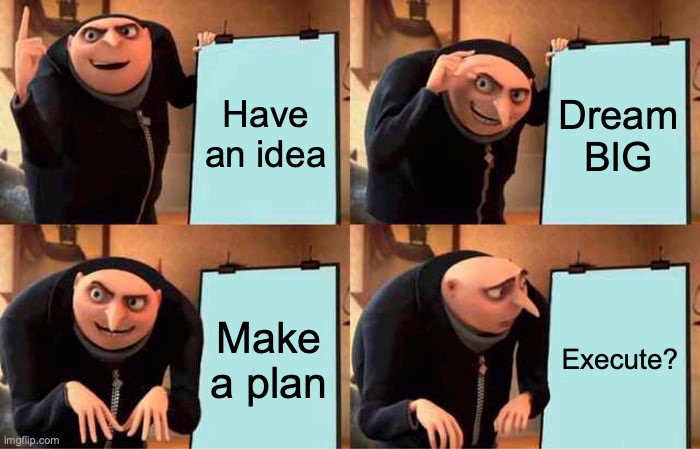When you are young and see your future self thriving, achieving dreams, and growing into the person you aspire to be. Once you grow older, you might catch yourself saying “I had big plans”. Or even be sad about the fact, that your plans didn’t work out yet.
What you’ll find inside:
Most of the people I know get the planning wrong, as their plans don’t survive reality. It is not only the plan itself, but the process of planning itself. It helps you figure out if what you’re doing right now makes sense.
You don’t have to be smart, but have a plan
People often think success comes from being intelligent. But having a good plan can be just as important, or even more important. While smart people think fast, a plan offers structure and direction. It is a blueprint for anyone, regardless of their intellectual abilities, to achieve their goals.
With defined steps in place, you can navigate obstacles with confidence and focus, ensuring that your efforts are aligned with your objectives. Having a good plan and thinking ahead means you don’t have to rely on sudden, brilliant ideas. It shows that steady, step-by-step efforts can make up for not being the smartest.

You plan, God laughs
The trouble with plans is that only those that work in the real world are helpful. Exactly this is the hard part of planning and we will get to that.
But even bad plans are better than nothing. Because the process of planning is equally important as the plan itself. Crafting a plan helps in cultivating valuable skills such as discipline and time management. When you work with a plan, you are more likely to develop a problem-solving mindset, as the process requires thinking ahead and analyzing potential outcomes. This strategic approach encourages continuous learning and adaptability, which are crucial traits in any field.
Hope for the best, plan for the worst
Even if you don’t have all the answers at the onset, a plan allows you to identify resources and support systems you may need, ensuring that you are not working in isolation. Planning helps us do things better. It shows that anyone can succeed if they organise, try hard, and keep going.
What makes a good plan?
Our future is filled with unknowns – this is reality for all of us. A good plan does not pretend this was not true. It embraces the this fact with room for errors. Because the more you need specific elements in your plan to be true, the more fragile your plan becomes.
Margin for mistake can come in different forms for you plan and planning process:
- Loose timeline: Not relying that e.g. you have to master a skill by a defined deadline. If you do, this will be a bonus on top, but if you don’t, there should not be extra punishment.
- Flexible thinking: This could be a wiggle room for interpretation of your personal growth aspiration. Loosing five pounds in three months might be harder to achieve than becoming someone that lives healthy. See also goals vs system oriented thinking.
- Use of resources: Be it time, money, machines or other people – you can adopt the way on how you make use of it. Being cost-effective or extravagant might help in overcoming the challenges you might face.
I got it wrong for so many years that leaving room for error has nothing to do with being conservative. Conservative thinking is about avoiding a certain level of risk. You do not want to limit yourselves, especially if it is about personal growth plans.
Following this advice you are planning for what is not going according to your plan. I feel that especially the wiggle room for mistakes in planning is under appreciated. If considered well it will raise your odds to succeed by allowing you to stay on course with your plan. It allow you to change course without abandoning the whole plan and start over again or even worse quitting.
But keep in mind: Even your best plan is just an idea unless you put it into action.
Conclusion
- A plan is the lynchpin between your intention and the actual action.
- Plans are only useful, if they can survive reality. And all our future reality is filled with unknowns.
- Many plans don’t work out not because they’re bad, but because they’re just okay when they actually need to be perfect.
Further readings:
- “Psychological aspects of planning” research paper
- How to create personal growth plan – Tony Robbins

Leave a Reply